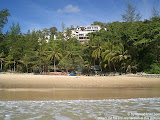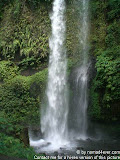 When traveling to other countries, you will most likely have to deal with local currencies. Baht, Rupiah, Rupee, Peso, Dong, Remimbi, Won, Riel, Yen and various kinds of Dollars are only a few currencies you can run across Asia.
When traveling to other countries, you will most likely have to deal with local currencies. Baht, Rupiah, Rupee, Peso, Dong, Remimbi, Won, Riel, Yen and various kinds of Dollars are only a few currencies you can run across Asia.
Depending on what your home currency is, you have to exchange your home money from time to time into a local currency.
I have bank accounts in Germany (Euro) and Singapore (SGD), so depending on which currency offers a better exchange rate compared to the country I’m currently in; I decide from which account to draw money.
If you just travel for a shorter period of time and returning to your home country afterwards, you have basically 2 common options to obtain local currency: bringing cash in and changing it at a Money Changer – or a simple withdrawal from your bank account at home, with a banking or credit card via an ATM (Automated Teller Machine).
What is the way to go? Here is a short overview about the advantages and disadvantages of either of the options:
ATM
Pros
- Fixed Exchange rate per withdrawal date directly from your home bank account
- usually available 24/7 around the clock
- no need to carry large sums of cash around
- ATM’s can nowadays be found almost everywhere
Cons
- Usually additional fees when drawing outside your bank’s network
Money Changer
Pros
- Cash is accepted virtually everywhere
- Can change even small amounts of ‘leftover’ money from previous destinations
Cons
- Have to carry plenty of cash around
- there are lot’s of shady Money Changers around
- Even though it says no transaction fee, you will most likely get a less favorable exchange rate, with transaction fees incorporated
 Some day a few years back it dawned on me, that I should avoid Money Changers like the pest, or only use them to change ‘leftover’ money or other sorts of cash I might have obtained along the way. There is one exception: the Airport Money Changers in Singapore. Although only American Express and UOB are approved money changers there, my experiences with them are good in general. When using Singapore as my traveling hub a while back; I usually changed ‘some starting money’ into the destination currency there, got a good rate and had peace of mind. Just be aware that they sometimes don’t update their rates, if it is a public holiday. I had one incident, when getting a worse rate due to that occasion.
Some day a few years back it dawned on me, that I should avoid Money Changers like the pest, or only use them to change ‘leftover’ money or other sorts of cash I might have obtained along the way. There is one exception: the Airport Money Changers in Singapore. Although only American Express and UOB are approved money changers there, my experiences with them are good in general. When using Singapore as my traveling hub a while back; I usually changed ‘some starting money’ into the destination currency there, got a good rate and had peace of mind. Just be aware that they sometimes don’t update their rates, if it is a public holiday. I had one incident, when getting a worse rate due to that occasion.
Here in Bali you have hordes of Money Changers every 20m on the main roads. I wonder how they all survive. Even though they offer great rates, I mainly don’t hear good stories about them, as most of them will try to cheat you or pull some finger tricks when counting your money before your eyes. I wouldn’t want to start my holiday with those kinds of troubles.
And how about Travellers Cheques, as offered by American Express or Thomas Cook? I don’t know how you feel about those, but personally I don’t like them. Your money is basically spent already beforehand. It doesn’t earn you interest anymore, isn’t accepted anywhere and most banks charge additional fees or less favorable exchange rates to cash them in. My experience is that you get the worst exchange rates with Traveller Cheques.
Of course, you have the added protection in comparison to cash. But somehow it’s unflexible money not suitable for Nomadic travelers.
Somehow it all comes down to a balance of convenience, safety and fees to pay. It’s probably best to chose what works best for you. So what do you think?
or save article to your Facebook with 1 simple click:




September 24th, 2007 at 1:26 pm
[…] How to obtain local currency when traveling abroad […]
April 3rd, 2009 at 4:20 pm
There are a few things that you should always have:
1) US Dollars: preferably small notes like $1, $10 (Keep 10 pieces)
2) Big notes. It’s especially important when you are going to remote places without reliable ATM, big banks and Western Union branches. The most convenient is US$, though the biggest denomination is US$100, whereas the biggest one for Euro is 500 Euro (500 Euro=6-7 times US$100). Although you can find 1000 Swiss Franc notes which is worth even more (=8-9 US$100 note), it is not as widely acceptable as Euro. So, I would suggest that you keep a piece of Euro 500 and a few US$100 notes if you need to go to remote places.
3) Otherwise, the best way to obtain money is to carry a few ATM cards (3 or 4). Try to limit the amount of balance in each bank account linked to each ATM card so that even if you lose you card (by force or theft) and PIN, you limit the amount of loss. (eg. to US1,000 per account). You should check out with your banks how much they charge for cash withdrawal from overseas ATM. Of course, choose those with the most favorable terms.
4) Have one main account with most of your cash reserve, but don’t have any card linked to it. Instead, use this account to transfer cash to your ATM-linked accounts periodically. You should have a double-security for this account, and most internet banks do provide this (they give you a small device that generates a second PIN, which changes randomly over time, or SMS this second PIN to your mobile phone). You can also use this account to manage your investments in bonds, stocks, etc.
5) Always use cash (physical) or paypal (online) for payments. Avoid using credit or debit cards. Your card numbers may be stolen. So, withdraw cash, use cash to pay. If you are paying online, try to use paypal so that you don’t reveal your card numbers. As explained, either use local currencies or keep plenty of US$ notes to do this. It’s still the world currency.
April 3rd, 2009 at 10:47 pm
Great tips here, adventuresaddict! The idea with the several bank cards is good, preferably even different currencies, so you can simply withdraw from the account, where you’ll get the best exchange rate. Sometimes the Dollar rates better against your local currency, sometimes the Euro, so there you go.
To break big notes (nobody in Asia likes to change those anyway) I usually use the gas station when filling up my tank or larger supermarkets with electronic cash registers. Less likely to cheat you…